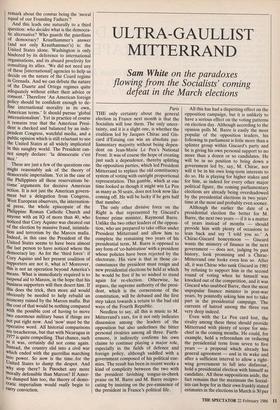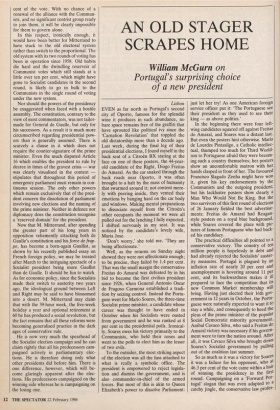ULTRA-GAULLIST MITTERRAND
Sam White on the paradoxes
flowing from the Socialists' coming defeat in the March elections
Paris THE only certainty about the general election in France next month is that the Socialists will lose them. The only uncer- tainty, and it is a slight one, is whether the coalition led by Jacques Chirac and Gis- card d'Estaing can win an absolute par- liamentary majority without being depen- dent on Jean-Marie Le Pen's National Front. It was of course the hope of creating just such a dependence, thereby splitting the opposition parties, which led President Mitterrand to replace the old constituency system of voting with outright proportional representation. This gamble, which at one time looked as though it might win Le Pen as many as 50 seats, does not look now like coming off. He will be lucky if he gets half that number.
The only other divisive force on the Right is that represented by Giscard's former prime minister, Raymond Bane. Unlike the two other leaders of the opposi- tion, who are prepared to take office under President Mitterrand and allow him to complete the remaining two years of his presidential term, M. Bane is opposed to any form of 'co-habitation' with a president whose policies have been rejected by the electorate. His view is that in those cir- cumstances the president must resign and new presidential elections be held at which he would be free if he so wished to stand again for re-election. Otherwise, he argues, the supreme authority of the presi- dent, which is the cornerstone of the constitution, will be debased and the first step taken towards a return to the bad old ways of the Fourth Republic. Needless to say, all this is music to M. Mitterrand's ears, for it not only indicates dissension among the leaders of the opposition but also underlines the bitter personal rivalries among all three. Furth- ermore, it indirectly confirms his own claims to continue playing a major role, especially in the fields of defence and foreign policy, although saddled with a government composed of his political ene- mies. The result has been in recent weeks a kind of complicity between the two with the president lavishing tongue-in-cheek praise on M. Bane and M. Barre recipro- cating by insisting on the pre-eminence of the president in France's political life. All this has had a dispiriting effect on the opposition campaign, but it is unlikely to have a serious effect on the voting patterns on election day. Although according to the opinion polls M. Bane is easily the most popular of the opposition leaders, his following in parliament is little more than a splinter group within Giscard's party and he is giving his own personal support to no more than a dozen or so candidates. He will be in no position to bring down a government led by, say, M. Chirac, nor will it be in his own long-term interests to do so. He is playing for higher stakes and for him, as indeed for every other major political figure, the coming parliamentary elections are already being overshadowed by the presidential elections in two years' time at the most and probably even sooner.
Although the earlier the date of a presidential election the better for M. Bane, the next two years — if it is a matter of years instead of months — should provide him with plenty of occasions to lean back and say 'I told you so.' A Chirac-Giscard honeymoon — Giscard wants the ministry of finance in the next government — does not, judging by past history, look promising and a Chirac- Mitterrand one looks even less so. After all, it was Chirac who sunk Giscard in 1981 by refusing to support him in the second round of voting when he himself was knocked out of the competition, and it was Giscard who snubbed Bane, then the most unpopular finance minister in post-war years, by pointedly asking him not to take part in the presidential campaign. The currents of hatred among the three run very deep indeed.
Even with the Le Pen card lost, the rivalry among these three should provide Mitterrand with plenty of scope for mis- chief in the coming months. He could, for example, hold a referendum on reducing the presidential term from seven to five years — a proposal which already has general agreement — and in its wake and after a sufficient interval to allow a right- wing government to fall into disfavour, hold a presidential election with himself as candidate. All these suppositions aside, the fact remains that the maximum the Social- ists can hope for in their own frankly stated estimates in the elections in March is 30 per cent of the vote. With no chance of a renewal of the alliance with the Commun- ists, and no significant centrist group ready to join them, it will be clearly impossible for them to govern alone.
In this respect, ironically enough, it would have been better for Mitterrand to have stuck to the old electoral system rather than switch to the proportional. The old system with its two rounds of voting has been in operation since 1958. Old habits die hard and the dwindling reservoir of Communist votes which still stands at a little over ten per cent, which might have gone to Socialist candidates in the second round, is likely to go in bulk to the Communists in the single round of voting under the new system.
Nor should the powers of the presidency be exaggerated when faced with a hostile assembly. The constitution, contrary to the view of most commentators, was not tailor- made for General de Gaulle, but only for his successors. As a result it is much more circumscribed regarding presidential pow- ers than is generally assumed. There is scarcely a clause in it which does not require the counter-signature of the prime minister. Even the much disputed Article 16 which enables the president to rule by decree in times of the gravest crisis — war was clearly visualised in the context stipulates that throughout this period of emergency parliament must remain in con- tinuous session. The only other powers which remain exclusively that of the presi- dent concern the dissolution of parliament involving new elections and the naming of the prime minister. Neither in defence nor diplomacy does the constitution recognise a 'reserved domain' for the president.
Now that M. Mitterrand, after spending the greater part of his long years in opposition vehemently attacking both de Gaulle's constitution and his force de frap- pe, has become a born-again Gaullist, as shown by his recently published essay on French foreign policy, we may be treated after March to the intriguing spectacle of a Socialist president being more Gaullist than de Gaulle. It should be fun to watch. As for economic policy, since the Socialists made their switch to austerity two years ago, the ideological ground between Left and Right may be said to have blossomed into a desert. M. Mitterrand may claim that with the 39-hour week, the five-week holiday a year and optional retirement at 60 he has produced a social revolution, but the fact remains that all these reforms were becoming generalised practice in the dark ages of conservative rule.
He is now very much the spearhead of the Socialist election campaign and he can claim rightly that all his predecessors cam- paigned actively in parliamentary elec- tions. He is therefore doing only what other presidents did before him. There is one difference, however, which will be- come glaringly apparent after the elec- tions. His predecessors campaigned on the winning side whereas he is campaigning on the losing one.















































 Previous page
Previous page